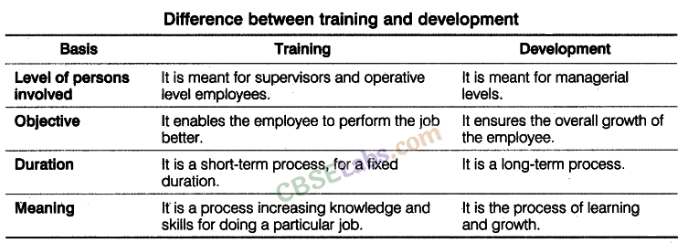Staffing – CBSE Notes for Class 12 Business Studies
1. Staffing It consists of manpower planning, recruitment, selection, training, compensation, promotion and maintenance of managerial personnel.
According to Dale Yoder, “Staffing is that phase of the management which deals with the effective control and use of manpower or human resources.”
2. Importance of Staffing
(i) Filling the roles by obtaining competent personal
(ii) Placing right person at the right job
(iii) Growth of enterprise
(iv) Optimum utilisation of human resources
(v) Helps in competing
(vi) Improves job satisfaction and morale of employees
(vii) Key to effectiveness of other functions
3. Staffing as Part of Human Resource Management When staffing function is carried on at a large scale, it becomes human resource management.
(i) Evaluation of HRM

4. Activities of Human Resource Management
(i) Human resource planning
(ii) Recruitment, selection and placement
(iii) Career growth
(iv) Performance appraisal
(v) Motivation
(vi) Compensation
(vii) Social security
5. Staffing Process The steps involved in the staffing process are
(i) Estimating the manpower requirements
(ii) Recruitment
(iii) Selection
(iv) Placement and orientation
(v) Training and development
(vi) Performance appraisal
(vii) Promotion and career planning
(viii) Compensation
6. Recruitment It refers to the process of appointing possible candidates for a job or a function. It has been defined as the process of searching for prospective employees and stimulating them to apply for jobs in an organisation.
7. Sources of Recruitment There are two sources of recruitment
(i) Internal
(ii) External
8. Internal Sources Under internal source of recruitment the vacant job positions are filled by inducing the existing employees of the organisation
(i) Advantages
(a) It is economical.
(b) It motivates the existing employees.
(c) Through transfer, employees get draining also in the form of job position.
(ii) Drawbacks
(a) No fresher new ideas will come in the organisation.
(b) There will be limited choice.
(c) Not suitable for new organisation.
(d) Frequent transfer may reduce the productivity of employee.
(iii) Methods Under the internal recruitment following methods of recruitment are used
(a) Transfer
(b) Promotion
9. External Sources When the candidates from outside the organisation are invited to fill the vacant job position then it is known as external recruitment.
(i) Advantages
(a) Fresh talent
(b) Wider choice
(c) Qualified personnel
(d) Latest technological knowledge
(e) Competitive spirit
(ii) Drawbacks
(a) The morale of existing employees goes down.
(b) Lengthy process.
(c) The new employees may not adjust in the rules and regulation of the organisation.
(d) It is expensive.
(iii) Methods The common methods of external sources of recruitment are
(a) Direct recruitment
(b) Casual callers
(c) Advertisement
(d) Employment exchange
(e) Placement agencies and management consultants
(f) Campus recruitment
(g) Recommendations of employees
(h) Labour contractors
(i) Advertising on television
(j) Web publishing
(k) Factory gate
10. Selection It can be defined as discovering most promising and most suitable candidate to fill up the vacant job position in the organisation.
11. Process of Selection
(i) Preliminary screening
(ii) Selection test
(a) Intelligence test
(b) Aptitude test
(c) Personality test
(d) Trade test
(e) Interest test
(iii) Employment interview
(iv) Reference and background checks
(v) Selection decision
(vi) Medical examination
(vii) Job offer
(viii) Contract of employment
12. Training and Development
(i) Training Training means equipping the employees with the required skill to perform the job.
(ii) Development It refers to overall growth of the employee. It focuses on personal growth and successful employees development.
13. Benefits of Training for Organisations
(i) Reduced learning time
(ii) Better performance
(iii) Attitude formation
(iv) Aids in or help in solving operational problems
(v) Managing manpower need
(vi) Helps to adopt changes
14. Benefits of Training for Employees
(i) Better career options
(ii) Earning more
(iii) Boost up the morale.
(iv) Less chance of accidents
15. Difference Between Training and Development

16. Training Methods
(i) On the Job Methods
(a) Apprenticeship programmes
(b) Coaching
(c) Internship training
(d) Job rotation
(ii) Off the Job Methods
(a) Classroom lectures
(b) Films
(c) Case study
(d) Computer modelling
(e) Vestibule training
(f) Programmed instruction
CBSE NotesCBSE Notes Business StudiesNCERT Solutions Business Studies